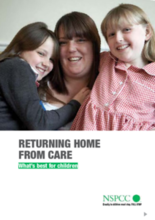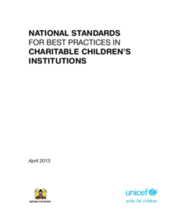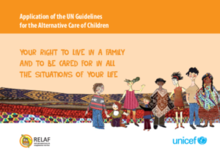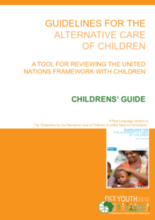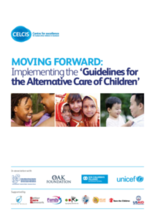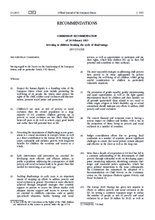Displaying 161 - 170 of 274
This assessment toolkit and associated supporting documentation has been created to assist PSWO’s and Child Care Institutions to achieve compliance with the Children (Approved Home) Regulation 2010.
This report, published by the National Society for the Prevention of Cruelty to Children (NSPCC) in the UK, highlights the need to improve outcomes for children leaving care and returning to parents or families. The NSPCC provides recommendations for policymakers and practitioners to improve the quality of assessment, planning, and preparation regarding when and if a child should be returned home from care and to increase the support for children and their families once they return to their families.
This document was developed with the aim of assisting Charitable Children’s Institutions (CCIs) in Kenya to boost their capacity for determining which children need to be admitted into CCIs, how to provide adequate care and protection to the children and how to plan the eventual exit of the children back to their families and communities.
This Program Review documents the evolution of EveryChild/Partnerships for Every Child’s Program in Moldova since 1994, presenting the development of interventions to improve the lives of children through deinstitutionalization and identifying the best practices and lessons that may be relevant, useful, and replicable to other initiatives and organizations around the world.
This new radio report from US National Public Radio (NPR) challenges some of the misconceptions about fostering, including that people foster for the money or that foster parents “must be saints to take in other people’s children”. Two main speakers, a foster parent for over 15 years to more than 40 children, and a Professor at the University of Richmond School of Law share their insight and experiences about fostering in the US context.
This RELAF booklet, Application of the UN Guidelines for the Alternative Care of Children, is a child-friendly guide to the Guidelines of for the Alternative Care of Children meant for children and adolescents to inform them of their right to live with their families and make that right a reality.
This booklet from SOS Children’s Villages International was created for young people to explain in a simple manner the main points of the Guidelines for the Alternative Care of Children approved by the United Nations General Assembly in 2009. The booklet helps its young audience think about the principles of alternative care and what these mean for children and families in different situations.
This handbook, Moving Forward: Implementation of the ‘Guidelines for the Alternative Care of Children,’ is aimed at legislators, policy-makers and decision-makers, as well as professionals and care providers, to support the implementation of the Guidelines for the Alternative Care of Children, endorsed by the United Nations General Assembly in 2009. It explains the key thrusts of the Guidelines, outlines the kind of policy responses required, and describes ‘promising’ examples of efforts already made to apply them in diverse communities, countries, regions and cultures.
This Recommendation by the European Commission on Investing in Children, stresses the importance of early intervention and preventative approaches, and makes quality childcare one of its key policy areas to break the cycle of disadvantage in early years and reduce the risk of child poverty and social exclusion.
This report from SOS Children’s Villages assesses Malawi’s compliance with, and implementation of, the UN Guidelines on the Alternative Care of Children.


